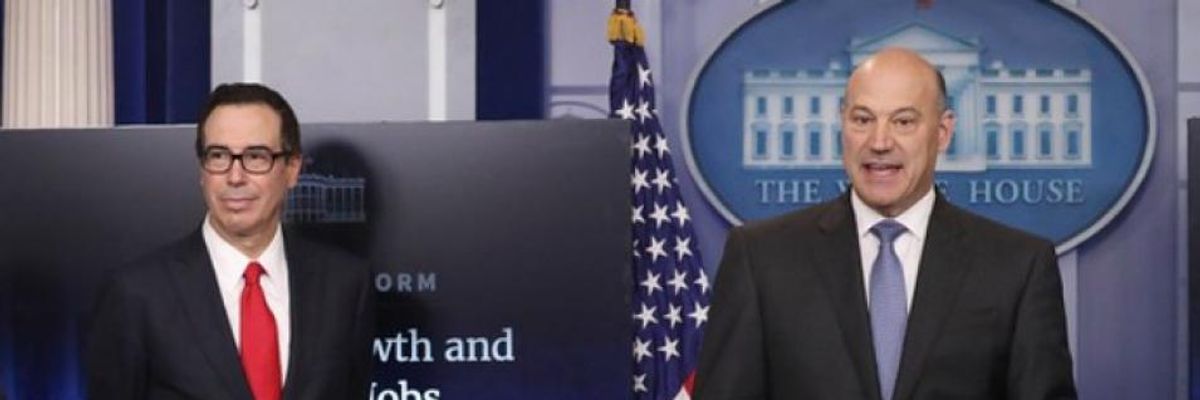The Treasury Department on Monday released a report (pdf) that "grants Wall Street its wishes" by recommending the White House defang the Consumer Financial Protection Bureau (CFPB) and severely roll back regulations established following the financial meltdown of 2008.
"The financial crisis had devastating costs for families and communities, and everyday abuses in financial markets cost people tens of billions of dollars a year."
--Lisa Donner, Americans for Financial Reform
Predictably, the financial industry met the report with enthusiasm.
But as Sen. Sherrod Brown (D-Ohio) noted, the industry couldn't have been surprised by the report's contents, given that banking groups were consulted heavily during its creation.
As Brown wrote in a statement, "Treasury consulted with banking industry groups at a ratio of 17-to-1 over consumer groups when formulating the report."
Brown concluded by providing a list that starkly illustrates where Treasury Secretary Steve Mnuchin, a former Goldman Sachs banker, looked for advice.
- Government Entities: 18
- Consumer Advocates: 14
- Academics: 13
- Think Tanks: 15
- Banking Industry Groups: 244
Sen. Elizabeth Warren (D-Mass.), who spearheaded efforts to create the CFPB, also denounced the Treasury's recommendations, arguing that they would "make it easier for big banks to cheat their customers and spark another financial meltdown."
The report comes on the heels of House Republicans' vote to pass the CHOICE Act, legislation that takes aim at Dodd-Frank and other post-crash regulations. But given that the bill is unlikely to get past the Senate, the White House is looking for ways to advance President Donald Trump's right-wing agenda unilaterally.
Though the Treasury report lays out many familiar GOP talking points on the need to relieve small banks and credit unions of burdensome regulations, most of the benefits would disproportionately go to the nation's largest financial institutions.
"Changes proposed by the Treasury Department include easing up on restrictions big banks now face in their trading operations, lightening the annual stress tests they must undergo, and reducing the powers of the Consumer Financial Protection Bureau (CFPB), which has been aggressively pursuing bad behavior by financial institutions," Reuterssummarized. "The industry has long sought many of the proposed changes, which would mostly benefit banks like JPMorgan Chase & Co (JPM.N), Bank of America Corp (BAC.N), Citigroup Inc (C.N), Wells Fargo & Co (WFC.N), Goldman Sachs Group Inc (GS.N) and Morgan Stanley (MS.N)."
Following the publication of the report, consumer advocacy groups were quick to react to what they deemed a sop to Wall Street at the expense of the public.
"The financial crisis had devastating costs for families and communities," Lisa Donner of Americans for Financial Reform told the New York Times, "and everyday abuses in financial markets cost people tens of billions of dollars a year."
In a statement released on Tuesday, Lisa Gilbert, vice president of legislative affairs for Public Citizen, called Treasury's proposals an invitation for "financial scam artists to prey on American victims."
"We need stronger protections for consumers, but instead, this proposal is a toxic concoction of repackaged banker handouts that industry lobbyists have pushed since the passage of Dodd-Frank." Gilbert concluded. "The report ignores the tremendous damage caused by Wall Street in the 2008 crash and the continued evidence--such as Wells Fargo's millions of fraudulently opened accounts--that we need tougher regulation and enforcement."

